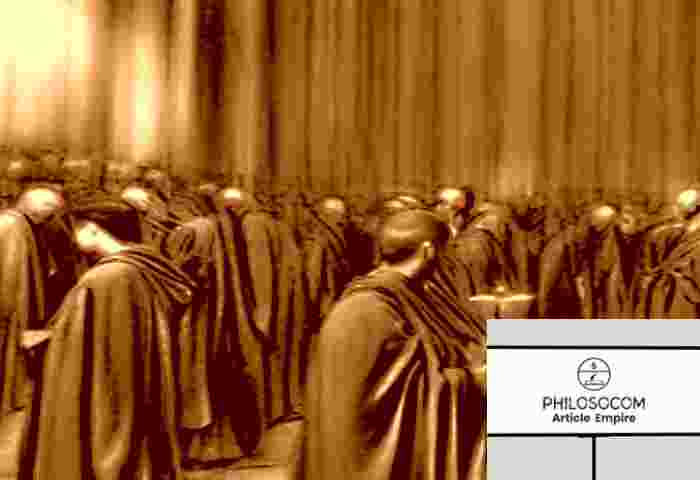The Essence of Loyalty -- Why It's Important To Be Loyal
- Mr. Tomasio Rubinshtein

- Dec 24, 2021
- 7 min read
Updated: Oct 16

Why Loyalty is Your Most Precious Asset
Loyalty is the most important resource anyone could possibly have, and not only philosophers or any other kind of content creator -- but it is also the glue that keeps others attached to you, and makes them want you in their lives. Should their loyalty be too low, they would consider leaving or abandoning you, regardless of your past relationship with them.
The family is usually the ultimate base of loyalty between the members within it, even if it is far from perfect. It is usually from there that you receive unconditional love from your parents, or perhaps from other family members as well.
Abandon your family, and you will abandon the most elementary base of loyalty you'll probably ever have in your life. Of course, there are exceptions because not all people get a good enough family when they are born, but I digress.
Understanding Loyalty as the Currency of Connection
Loyalty doesn't necessarily have to come from patriotism or adoration. The fact that you keep reading my articles, for instance, is a demonstration of your loyalty to Philosocom. You aren't a subordinate, you aren't below me. Loyalty can also simply be being constantly interested in someone and what they have to offer. A business with no regular visitors, is a poor one.
Anything that you do regularly, such as buying the same product from the same brand, or reading from the same source, is a demonstration of loyalty. Consistency is, essentially, a good proof that you're loyal to something, be it a person, a brand, or an activity.
Loyalty is extremely important to anyone who wishes to survive and has something to offer to others. Be it to his or her community, to their country, or in this site's case -- to humanity. If you don't have enough loyal customers, they might start buying from your competitors, which means that you'll be losing the money required to keep a roof over your head and pay the bills.
Thus, it is the elementary duty of the business owner, a creator, and so on, to not only keep loyalty, but improve it, as well. Success in that department, can bring success overall.
It's also essential for any religion that wishes to remain relevant, in a world that is arguably getting more and more secular. Lose more and more communities within your religion, and the power of your faith might decrease on a regional or global scale.
Politics is also about loyalty, and the public philosopher ought to be versed in it, as well, in order to build a powerbase.
Loyalty is, indeed, a fight for relevancy, to be important enough in the eyes of others, that they will desire to be in your presence, buy your goods, listen to your words, read your material, and so on. As you can see, it is a very essential, abstract resource between at least two bodies. And at the times, that may include your loyalty to the company you're working for.
Cultivating Loyalty through Authenticity and Open Discourse
There are two ways to gain loyalty. The first is to get it naturally from people who are willing, and the other is by force, which is the far less desired one, unless you live in a dictatorship (or are the dictator). How do we know, for example, who is the bad guy in a movie? If he kills someone for treason or for insubordination, just to get the rest of his henchmen more loyal, then we may know that he is, indeed, the antagonist of the movie.
The concept of "blind loyalty" is dumb because we humans are skeptical beings. Not purely, no, but partially, at the very least... If we do not adore someone or something strongly enough, we cannot force it to come from our hearts. Honest loyalty is like water, it is spontaneous. Force people to be loyal, and they will question either your authority, validity, or credibility.
(But! It does not mean that humans cannot be blinded by loyalty, different factors will turn them to become such. When they turn into blind loyalists, they are, essentially, fanatics.)
The only exception I can think of is in the military, where you ought to listen to your superiors without question, simply because that's how things are there. A military with no subordination can easily be a very disorganized, incompetent warband, that might as well betray its own authorities and countries.
The greatest loyalty someone can have in order to survive, is loyalty to money. Many of us work merely for the sake of getting money, and to be sincere, that alone can be a good enough reason to keep working. It is far better than volunteering while needing to make a living. You don't exactly buy food at the store with good will alone.
Loyalty is, arguably, something that can be either for one's own interests or for wanting to be a part of a bigger cause than themselves. The feeling of being a part of a group or an organization, that you can feel belongs to, is a very rewarding incentive. That incentive becomes dangerous when the organization quickly becomes a cult or any other authoritarian regime, led by a leader whom you are expected to respect without question.
This drive for collectivity can also nurture a herd mentality.
A philosopher should not ask for blind loyalty from his or her audience, simply because doubt is an important element of philosophizing. A philosopher who is not ready to admit that they are wrong sometimes, even if they are not wrong currently, is a bad philosopher. An ideology shouldn't be made into something superior to the search for the truth, because if you do so, you ruin the whole reasoning of becoming a philosopher -- to seek what is correct and reveal what is incorrect.
Philosophy is the study of truth. It isn't the art of indoctrination.
Every member of a philosopher's community should be strong enough to doubt the philosopher's findings and insights, because if they do not, they risk overlooking the importance of criticism. Even great philosophers can and should be doubted, so why not everything and everyone else?
And I myself, can critique anything that moves, so to speak. It's one of the reasons I wrote so much.
An open discussion between at least two sides, is ultimately the healthiest of ways loyalty can be created; where members can feel free to voice their thoughts, and where the "leader" or "authority" can feel strong enough to receive them. Offense, however, is the greatest liability to the receiving side, if said side is sensitive.
(Perhaps, the best community a public philosopher can make, is one that's based on democratic leadership. I, however, choose to maintain readership instead. A readership and a community are not the same. I don't have the energies to build a philosophical community. I'm working around the clock, managing this content empire.)
Beyond the Thin Skin
What I think some people fail to realize is that wanting to not be offended, does not mean the receiving end is not interested in criticism. Some people are, unfortunately, more sensitive than others, and if open thinking is to be generated in a framework, then tolerance should be created in the name of better interaction, trust, and loyalty in general.
To put it briefly, loyalty is simply any reason, strong enough to make people stay by your side. Retain and improve their loyalty, and you will increase the promising possibilities of your craft. Demoralize them, and they will either leave, betray, or both. Nurture blind loyalty, and if you're successful, which you shouldn't, you can become a cult leader. This is both a positive and negative value. Make sure you handle it wisely. In yourself, and in others.
Downsides of Loyalty
To quote this saying shared by anonymous:
One mistake you should never make in this life is to allow yourself to be recruited, by someone, to hate another person who hasn't wronged you. Only a fool inherits other people's enemies as a sign of loyalty.
Loyalty, while a generally positive trait, can have some drawbacks depending on the situation. In order to look both ways, consider the negative aspects of loyalty.
Missed opportunities: Being overly loyal to a person, company, or idea can blind you to better options. For example, if you stay at a job you hate out of loyalty to the company, like a salaryman may do, you might miss out on a job you love at a different company.
Being taken advantage of: People who know you're loyal might try to exploit that loyalty. This could be expressed in a narcissist and their victim, this could be a friend who constantly borrows money and never pays you back, or a company that offers you lower wages because they know you won't leave either way. That is how your affiliation bias plays against you.
Lack of growth: If you're always loyal to the status quo, you might be less likely to challenge yourself and try new things. This can hinder your personal and professional growth. In fictional organizations, like the authoritarian Galactic Empire, loyalty leads to creative stagnation.
Unhealthy relationships: Loyalty is important in relationships, but it shouldn't come at the expense of your own well-being. If you're in a relationship with someone who is abusive or toxic, staying out of loyalty isn't healthy. Loyalty can be exploited by the very person or faction you're loyal to, under their ulterior motives.
Herd Mentality: Blind loyalty to a group can lead to a mentality where everyone agrees with each other even if they have doubts. This can lead to poor decision-making, due to the intellectual and practical value of doubt.
It's important to find a balance between loyalty and critical thinking. Be loyal to those who are worthy of your faith in them. Inspect them, judge their character, and see if they are trustworthy.







Comments